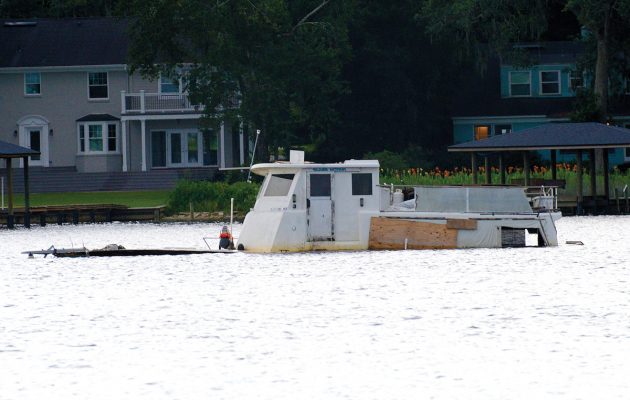Removal timeline uncertain for nautical eyesore
Posted on August 5, 2016 By Editor Articles, Neighborhood News, Top Stories

She sits in the Ortega River, quite content to remain partially submerged amid summer’s searing heat.
To neighbors, she is an eyesore, a derelict vessel and a distraction from an otherwise pleasant riverfront scene. To the Florida Fish and Wildlife Conservation Commissioner (FWC), she is the Class Action, a 51-foot vessel declared “Derelict and Not Hazard to Navigation.”
The Class Action arrived in the water between the Roosevelt and Ortega bridges sometime in 2014, residents say. A man would appear from the boat in the morning, row a dinghy to the northern shore of the river and then return later in the day.
“Something happened and it sunk”
This past June, a storm swept across the Ortega’s waters and unceremoniously sunk the Class Action.
“One day it was floating along and the next day you could tell something happened and it sunk,” said Janie Boyd, who lives along the south bank of the river on McGirts Blvd.
The vessel sits half-submerged in the water, perhaps too tired to keel over completely beneath the surface.
That the Class Action is now seemingly incapacitated raises questions about its future, particularly about who will move it and when it will be moved.
FWC declares vessel “derelict”
In situations like this, exactly who is in charge of the vessel’s removal and who enforces state laws regarding derelict vessels is based on jurisdiction and whichever agency comes upon the boat first, FWC Derelict Vessel Program Administrator Phil Horning said.
Both the FWC and Jacksonville Sheriff’s Office have jurisdiction over the waters in which the vessel is located. In this particular case, the FWC is conducting the investigation.
“When someone reports (a derelict vessel) to us, we do an investigation and try to contact the owner and tell them they’re subject to criminal charges if they don’t get their boat off the water,” Horning said.
The boat is officially derelict when authorities place on the vessel an orange sticker indicating the owner has five days to remove the vessel. Second, a certified letter expressing the five-day warning is sent out on the same day to the owner’s registered address.
In some cases, boat owners promise they’ll have their boat moved before the five-day deadline arrives, Horning said. If not, they could face criminal charges.
“We want to give an abundance of caution. We don’t want to take anyone’s stuff,” Horning said, “but, at the same time, we want them to follow through with their statement that they will remove their vessel.”
If the vessel isn’t moved in time, Horning said, the owner is still on the hook for the money it takes local or state agencies to remove the boat.
“If the owner of the vessel contacts the officer and explains his situation and asks for more time, that’s entirely up to the officer if he wants to continue,” Horning said. “Each vessel is different. Each location is different.”
The FWC declared the Class Action derelict on July 19, according to Karen Parker, FWC Public Information Coordinator. At the end of July, the boat still hugged the bottom of the Ortega River.
Removing the vessel
Pulling Class Action out of her watery grave will, most likely, fall under the responsibility of City of Jacksonville Waterways Coordinator Jim Suber, who coordinates the removal of derelict vessels.
Funding for the removal can come from five different sources: Duval County’s retained vessel registration fees, operating funds from City of Jacksonville, the Florida Inland Navigation District, FWC and the Florida Boating Improvement Program, Horning and Suber said.
The FWC’s budget for derelict vessel removal received a huge boost July 1 when lawmakers appropriated a one-time, $1.4 million grant for the 2016-2017 budget year.
There is no definite timetable on how long it will take to remove the boat after the five-day deadline passed.
“Every single derelict vessel is an animal within itself,” Suber said.
However, Horning pointed out that Duval County has proven efficient in removing derelict vessels.
“Jim Suber is a remarkable operator of this system,” he said. “Jacksonville has been very efficient. They usually don’t need a lot of help from the state.”
Sympathy for the owner
While the boat’s aesthetic qualities make it a Loch “Mess” Monster, measured sympathy was evident from McGirts residents, Suber and nearby Sadler Point Marina’s Brooks Busey.
“You feel sorry for the owner because he lived there; it was his home,” Boyd said. “He did lose his home, from that standpoint.”
Boyd’s neighbor Arnold Tritt also expressed sympathy for the man who was seen on the boat, though the FWC hasn’t confirmed the man seen on the boat is, in fact, the owner.
“I think…I can compartmentalize and I can look at the individual and say, that’s the same as someone’s home burning down or getting hit by a tornado,” Tritt said.
However, both neighbors acknowledged the boat’s haggard appearance. Both Tritt and Boyd deemed the vessel “unsightly.”
Busey, Sadler Point’s owner, also expressed sympathy, but with a straightforward touch of boating wisdom.
“I have misgivings about boat owners that don’t properly maintain their boats,” he said. “It’s like feeling sorry for someone whose house rots away…because they didn’t maintain it. You feel sorry for them, but, then again, you don’t.”
Suber’s final observations on the situation were fitting.
“I have sympathy for both sides,” he said. “There isn’t anybody that likes a derelict vessel. Even the owner doesn’t like a derelict vessel. It’s one of those things that even a mother doesn’t love. It’s a bad situation.”
By J.R. Duren
Resident Community News




 (1 votes, average: 5.00 out of 5)
(1 votes, average: 5.00 out of 5)




